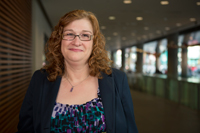Supporting grad studies recruitment and programs

The goal of the Academic Plan is to turn Concordia into one of the great comprehensive universities in the country. Strengthening graduate studies is one of the key actions designed to support this effort. The plan's three main priorities are innovative and dynamic undergraduate offerings, graduate student recruitment, and investments in the libraries.
NOW sat down with Paula Wood-Adams, interim dean of the School of Graduate Studies, and Joanne Beaudoin, administrative director of the School of Graduate Studies, to find out what is being done to recruit more top graduate students and improve the university’s graduate offerings.
What are some of the main efforts underway to support graduate studies under the Academic Plan?
Paula Wood-Adams:
One of the main things is providing increased funding, over $1.5 million per year, for graduate students. There’s actually a big portion of the budget of the Academic Plan that’s going towards that. We’ve created new awards for international students to help them cover the differential in their tuition, and we’ve also created 60 new $10,000, merit-based entrance awards, which all incoming graduate students are eligible for.
Another aspect is increasing TA (Teaching Assistant) positions. This is primarily meant to help undergraduate courses by providing undergraduate students with a small-class experience in the tutorials. But it also provides graduate students with experience teaching, and helps them pay for their studies.
We’re also doing a lot related to program development and reform. We’re working with programs, looking at their curricula, to see how they compare with their competitors. This is something new for us at Concordia, and we see it as a real opportunity for improvement. It directly addresses the section of the Academic Plan on making our programs more innovative and competitive.
Why is supporting graduate studies being emphasized in the Academic Plan?

Paula Wood-Adams:
One of our big goals is to enhance Concordia’s research mission. Graduate students are a key component of that. Working alongside our faculty members, they’re the people who do much of our research.
We have to be able to reach top prospective graduate students who are really interested in the kinds of research that we do. We have to make it easier for them to come, so that they can be here and can focus on their research, not on paying for their tuition.
Why is it so important to have a strong research component at the university?
Paula Wood-Adams:
It colours everything. If a professor is teaching a course, even if it’s a first-year undergraduate course, and they’re actively involved in research, they bring more current, immediate examples into the content of the course.
Also, having PhD students in a department interacting with all of the master’s students and the undergraduate students elevates the level of the educational experience.
Joanne Beaudoin:
Giving undergraduate students more exposure to graduate students means it (graduate studies) becomes a more viable option for them. They see it and think, ‘I could do that, that’s interesting to me.’
Also, there are some undergraduate research initiatives that are built into the Academic Plan, which give students who are in the final years of their undergraduate studies an appetite for what they could do if they went on to graduate studies.
What are some other aspects of graduate studies at Concordia used in recruitment efforts to attract top students?
Paula Wood-Adams:
When I’m out at recruiting events, one thing I talk about is our Graduate and Professional Skills training program (GradProSkills). Students really like that they have the opportunity to learn complementary skills that they wouldn’t normally get in their disciplinary training. Many students find the opportunity to come and have free French lessons through GradProSkills very appealing.
I also talk a lot about the 3-Minute-Thesis (3MT) competition. That’s something that the engineering students really like. It’s a competition and a training program in which graduate students learn how to communicate their research results to a general audience.
I speak about the opportunity to go to conferences. We have been offering a new conference award for the past few years, which makes a big difference.
Finally, we have facilities on par with some of the best institutions. With the new PERFORM Centre, we’re starting to do a lot of research in preventative health. Also, there is the new business school, the new Centre for Structural and Functional Genomics, and the new engineering and fine arts facilities.
In your position as an engineering professor, how have you seen graduate studies grow within your own faculty?
Paula Wood-Adams:
I joined here in 2001, and I think the next year my department graduated its 100th PhD student in 35 years. Now we have 150 PhD students in our program, and we graduate, I think, something like 20 a year.
It’s an enormous difference just in 10 or 12 years, and it’s a reflection of the kind of research that’s going on. You can’t be educating that many PhD students unless you’re in an active productive, research environment.
Related links:
• School of Graduate Studies
• Academic Plan

